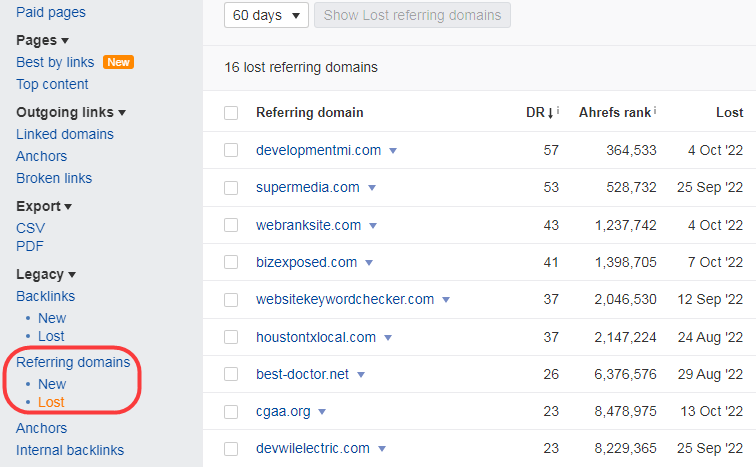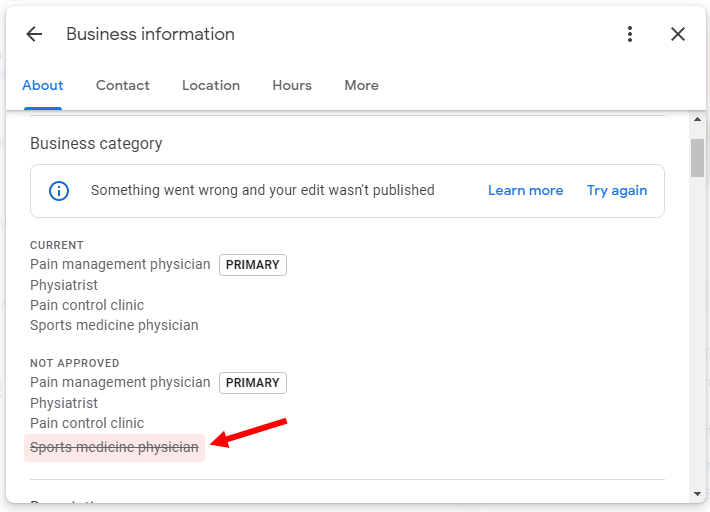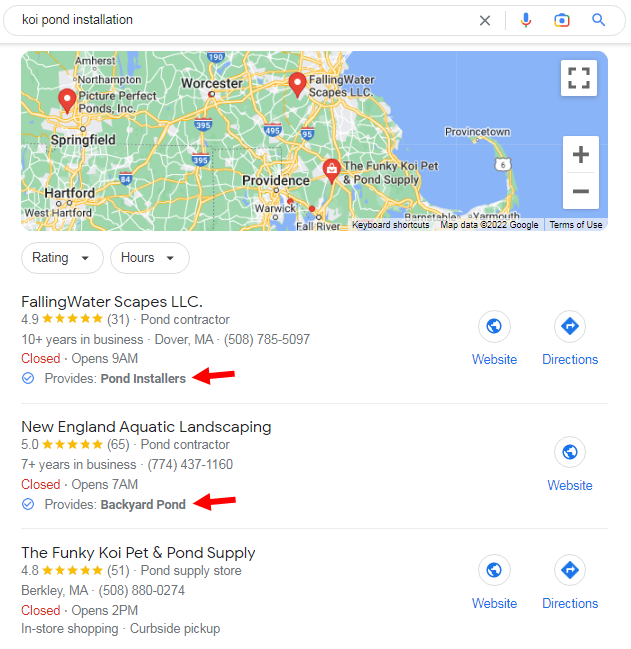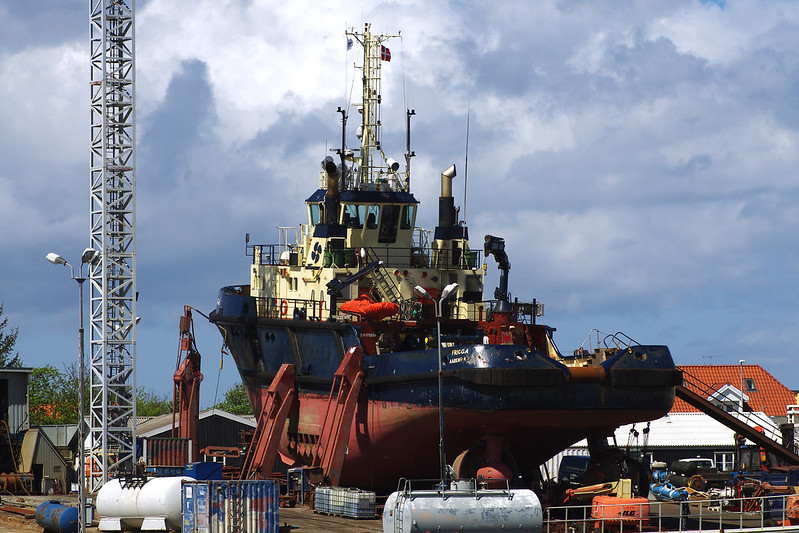What effects does time have on your business’s local visibility? What happens when you turn away – when you spend all your time on things other than SEO? A lot can happen, and most of it isn’t good. As with anything else, your position can decay over time. Even though you may not change your SEO setup in any way, it exists in an environment that changes it without your hands anywhere in sight.
How much hull maintenance you need to do is a tough question, partly because it’s a blend of two different but related questions I’m asked all the time:
- “Do I have to pay attention to SEO stuff constantly?”
- “I’ve eased up, and that seems to be showing in my rankings. What should I have kept up with?”
My response to each of the dueling banjos is the same: You can’t dwell on details constantly, or check everything every day, or else you’ll never have the time or willpower to get the big stuff done. But if you let certain problems fester they’ll become big problems that may consume you.
In other words, you can and should keep a close eye on some potential problems and keep a loose eye on others. You can do that only if you know what to keep an eye on, though. Below are the specific types of dry rot that can set in and affect your local rankings and ability to haul in new business.
Big common problems:
- Broken or lost backlinks. I’m talking about inbound links you used to have, but that point to a nonexistent page on your site, that were removed because you stopped ponying up for the membership or sponsorship (or whatever), or that were broken or lost for any other reason. If you can’t fix or restore the link yourself, and you can’t 301-redirect it to the right URL, then you probably just need to repeat whatever action got you the link in the first place. If your rankings have slipped over time (rather than suddenly), lost links may factor in. A simple Ahrefs check will tell you what you lost and when.

- Broken or lost internal links. Maybe you renamed or relocated some pages, or reworked your navigation, or tried to streamline things on your site. In any event, certain pages’ rankings can stall or drop over time if they lose too many links from other pages on your site, or if their internal links from prominent pages are replaced with links from pages nobody goes to.
- Deprecated, conflicting, or other broken plugins (if you’re on WordPress). A caching plugin that stops working can produce 5xx server errors and nuke your rankings within days. An SEO plugin (e.g. Yoast, Rankmath, All-in-One) that stops working can wipe out effective title tags that you wrote or configured through the plugin. Use as few plugins as you can, try not to lean too heavily on those you do use, keep any important plugin updated to the latest version, and have a webmaster available to parachute in if needed.
- Out-of-control Google Maps spammers. In case you haven’t noticed, Google isn’t too good at policing the local map, at least in any proactive way. It falls on you, on other honest businesses, and even on competing spammers to find and report and mitigate Maps spam, or else it’ll just keep floating in the pool (Caddyshack-style). You’ll probably always have a couple of spammy competitors to deal with even if you stay frosty. But if you turn away for too long or zone out, their numbers may be too great for you to rank for jack squat any time soon.
- Broken Google Search Console installation. Will the lack of data-collection hurt your rankings directly? But you won’t have crucial visibility-and-traffic data on your site when you need to troubleshoot, nor will you be able to use that intel for the kind of legwork that helps you get ahead over time.
- Auto-updates to your Google Business Profile. Google can change any of the info on your page, often without your approval. That info may not be accurate or may not be in line with your SEO strategy in some other way. There’s not much you can do about that if you don’t even know about it because you’ve peaced out.

- Outdated reviews, like those in which reviewers mention old names, old services, old locations, etc., and not what’s current. Of course, it’s good to have older reviews that may or may not be up-to-date, because often those show the track record of your business over the years. But it’s a problem if your ONLY reviews are old and outdated. Not only can you confuse people and squeeze less new business from your local visibility, but you also may not rank for some terms you otherwise might rank for. For more-specialized or niche terms, at least, it seems that sometimes all that’s needed for you to rank is for a couple of reviewers to use that term in their Google reviews.
- Blog posts that fade naturally. Some of your localized organic rankings, and maybe even some of your Maps rankings, may have come to you on the shoulders of a blog post that had legs. The main trouble is that even visible blog posts with good traffic and maybe a few links tend to peter out after a few months or a couple of years. I don’t know for sure why that is, though I have some theories. In any case, if you keep adding useful and appropriate internal links to a hit post, if you can scrounge a few more inbound links to it every now and then, and maybe if you expand or update the post over time, you can probably keep it rolling along.
Rarer problems:
- Using older and less-precise Google Business Profile categories. Google often adds, modifies, and removes categories. When a category is added, and if it’s relevant to your business, you’ll probably want to use it. Otherwise only your competitors benefit from the new category Google went out of its way to add.
- Overriding malicious Maps edits by competitors. Probably most of your competitors are honest, and any Maps edits they submit on your Google Business Profile are either nonexistent or rare and not meant to harm your business. But every now and then a competitor will set out to put gum on your shoes. If and when that happens you’ll want to know so you can reject the edit or contact Google support.
- Hosting, registrar, SSL certificate, and license lapses. Failing to renew your hosting, domain name, “https” status, or licenses for certain plugins or other software can knock the wheels off of your whole business, to say nothing of your local SEO work.
- Address info you may want to show on your citations. Many citations are created automatically, without your knowledge, based on business info that one directory gets from another directory or other source. Sometimes these sites get wind of your address and supply it to various directories, which you may not want showing up there.
- Unsupported WordPress theme or CMS. Your SEO work can’t go far if your theme or website platform rides off into the sunset without you.
- Lost permissions or access for you or a third party. Whether it’s your site, your Google Business Profile, a local citation source, or any other online property, if it requires a login, either you can lose the login info or it can expire. When that happens, you can’t make changes or updates you need to make.
- Plagiarists. Someone who rips off your content usually won’t outrank you. But on the off-chance you’re ripped off by someone whose site has a very strong link profile and maybe is a “big name,” then you’ll be out in the cold at least until you can do a DMCA takedown. A related problem pops up if too many sites of various shapes and sizes lift your content without any pushback, even if no single one of them is big threat individually. Rarely will they outrank you, but they may be on the same SERP as you. They’ll crowd you out, draw some clicks, and will infringe on your rights in a way that’s outrageous, egregious, and preposterous.
Smaller problems:
- Broken links from your other sites that link to your main site. A vast personal link farm may be unwise, but interlinking a few sites you own has little to no downside and some possible upside. Just make sure those links work, or else there’s no way they can help you even a little.
- Slower crawl frequency by Google. If there’s never or rarely anything new to see on your site, Google won’t come by as often, and won’t know as quickly if and when you do publish something new that might help your rankings.
- Unused Google Business Profile features. Google doesn’t add features often, and when they do, often the features are decorative, useless, or retired after a few months. But every now and then Google will introduce a feature that may have some sway on your Maps rankings. I’m thinking of “services,” “products,” and “offers.”

- No responses to reviews. I’ve never seen that owners’ responses to reviews help their rankings one pinch. I doubt they help at all. You know what can help rankings, though? Getting more reviews. You know what helps you get more reviews? Showing appreciation, or at least showing attention. It’s simple: customers are more likely to write you reviews when they know you’re paying attention. Also, people who pick you because of your reviews – and maybe your responses – are in turn more likely to review you when they’re in a position to, perhaps when you ask. For them, reviews are the coin of the realm.
- Unwanted duplicate listings on citation sources. Over time, often you’ll find listings you don’t want or need on various directories. They can come from any number of sources. The duplicate listings aren’t a problem if they’re on a pipsqueak site nobody goes to. But if they’re on Yelp, Facebook, BBB, or a site that’s prominent in your specific industry, you may run into problems if you leave them up.
- No visibility on new directories. The general trend has been that, in any given year more local and industry directories get a toe tag than a birth certificate. But new sites do pop up from time to time. Every now and then, check for new directories that cater to your industry, and get on them as soon as they start ranking for terms you want to rank for (unless maybe they’re pay-to-play and charge a crazy amount). Sometimes not only are they good directories that make someone’s life easier, but they also stick around for long enough to become consequential in your market. You can’t benefit from them if you’re not listed on them, and you won’t be on them if you don’t keep an eye out for them.
Stay frosty. It will save you many multiples of however much time you spend on it, and your rankings are more likely to stay afloat all the while.
Any questions, first-hand experiences, or points I forgot to mention? Leave a comment!

Great post Phil! Very comprehensive.
Danke, Jim.